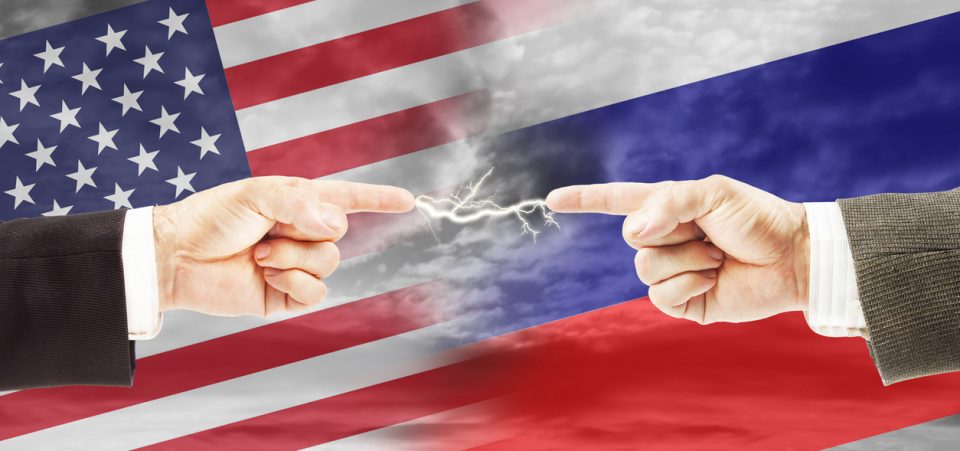Is Trump Raising the Risk Of WWIII or Trying to Revamp the U.S. Economy?
President Donald Trump has pulled the United States out of the Intermediate-Range Nuclear Forces (INF) Treaty with Russia. It was a crucial step in ending the Cold War; now, it’s a step to rouse the U.S. economy.
Former U.S. President Ronald Reagan and former Soviet Chairman Mikhail Gorbachev signed the INF Treaty in 1987.
Trump has accused Russia of violating the treaty by developing new weapons to offset the effects of the Treaty.
Many critics on the left, who suddenly discover themselves patrons of peace with Russia after alienating Moscow for years, accuse Trump of rekindling the Cold War.
Some even worry—and not incorrectly—that the White House has deliberately pursued aggressive policies that could lead to World War III.
Are They Right?
The INF Treaty concerns Europe more than it does the United States. What Trump is doing is less about rekindling a Cold War between the United States and Russia and more about stimulating defense spending with a nod to the U.S. economy.
That includes getting Europeans to spend more on defense, moving closer to the two percent of gross domestic product (GDP) that NATO expects. In a sense, that also means Europeans will reduce the burden of defense spending on the U.S. economy.
President Trump is not ideological. He’s a skilled wheeler-dealer (some might say manipulator) who understands that the defense industry is the only one that cannot rely on outsourcing in the same way other non-critical sectors are.
Canceling Deals Is All About Boosting the U.S. Economy
Therefore, scrapping the INF Treaty represents a deliberate strategy to boost the U.S. economy on two fronts.
The first is to increase the manufacturing of complex and expensive weapons. In the INF’s case, it implies a modernization or update of the entire nuclear weapon apparatus for domestic deployment (or direct U.S. deployment).
The second is to stimulate more European and NATO purchases of American weapons —such as Lockheed Martin Corporation’s (NYSE:LMT) “F-35” aircraft—directly or through licensing and cooperation efforts with local weapon manufacturers.
The repeal of the INF Treaty exploits some European countries’ fears, unfounded though they may be, of Russian aggression. It compels them to invest in armaments (which benefits U.S. industry).
As for stoking the fears of Americans, the White House is more than happy to let people believe that Russia is the main target. Rather, it’s China more than Russia that has become the real focus of the new Cold War (and potential enemy in a World War III).
The Real Enemy? It’s Not Russia or China
Yet the real enemy is neither Russia nor China. Rather, the real enemy is fear that the U.S. economy will lose the competition for top ranks.
The Trump way of upgrading the nuclear arsenal means not only contracting more missiles and rockets, but also building new nuclear bombs to be deployed from “B-2” bombers.
It also means contracting the design and manufacture of new land, sea, and air “platforms” (the F-35, for example, is a platform) capable of delivering the deadly payloads.
Russia gave Trump an ideal excuse to encourage an entire overhaul of U.S. nuclear strategy.
The Russian “MiG-31” fighter-bomber (similar to the U.S.’s “F-111” in appearance and role) is now capable of launching a hypersonic missile from its belly.
The missile’s name is “Iskander,” and it can evade missile defenses while spoofing interceptor missiles with decoys. In other words, the Iskander is sophisticated and deadly. (Source: “Why Russia’s Iskander Missile Is a Killer,” The National Interest, July 19, 2018.).
Missile Serves as Stimulus
Conveniently for the U.S. defense sector, Iskander serves as the ideal threat (or excuse) to attract new mega-billion-dollar projects to address it.
But while the focus appears to be on Russia, Trump’s goal may well be to encourage China to devote many more of its resources on building its defenses, perhaps taking resources away from infrastructure.
There are few doubts that Trump wants to pave the way for American rearmament. Russia remains everyone’s favorite enemy, and using it as the excuse to develop new weapons works for rallying support from both sides of the aisle.
However, given that Russia spent over 10 times less on defense than the U.S., it’s clear that whatever violations it has committed are relatively minor.
Indeed, in that sense, if Moscow has violated the commitments that Mikhail Gorbachev undertook with Ronald Reagan in the 1980s for years, Washington never thought it wise or useful to scrap them.
Doing so now, therefore, is not mere Trump megalomania or hillbilly foreign policy. Trump wants to play a Machiavellian game, which does relaunch the arms race and a new Cold War. But this time, the targets are both Moscow and Beijing.
Trump Has Shown Distaste for International Treaties
President Trump also doesn’t like to lose. Just as with his logic about trade (the more you export, the better), he wants to see America’s defensive and offensive capabilities in optimal condition.
Under this lens, analysts would be correct in identifying the vision of National Security Adviser John Bolton behind the INF move.
Bolton is a hawk’s hawk. He expressed clear anti-Russian and anti-Iranian positions when he served as U.S. ambassador to the U.N. for President George W. Bush.
Yet advisors will not dictate what Trump does. The president does business, not politics.
Rather than seek new agreements with Moscow and Beijing about what steps to take to restore the INF Treaty, Trump will seek bilateral agreements aimed at resetting new and higher tolerances for nuclear weapon deployment.
Obama Warned About Russia Violating INF Treaty
Former President Barack Obama, in fairness, accused Russia first. In 2014, Obama accused President Vladimir Putin of deploying banned weapons to intimidate former Soviet Bloc countries that showed interest in joining the European Union or NATO.
As many readers will recall, 2014 is the year when Russia took back Crimea in the context of the Ukrainian Civil War. Yet while Obama accused Russia of various violations, he dared not threaten the validity of the INF Treaty.
But Obama was careful about not overloading the U.S. Treasury, already under pressure from quantitative easing to keep near-zero interest rates.
Obama took office in the wake of the 2008 financial crisis. His mandate was to rekindle the U.S. economy.
Under those circumstances, boosting military spending seemed like the wrong approach in the context of the neoliberal world order that his foreign policy encouraged. Said policy included free trade and foreign interventions in the name of democratic ideals, despite tensions with the Kremlin.
Obama Had No Choice, But Trump Wants to Stimulate the Economy
Thus Obama left the INF agreement intact, suppressing any temptation to fuel a new arms race. For Trump, on the other hand, in the new isolationist context, a new arms race is a desirable stimulus for the U.S. economy.
Trump could deploy nuclear warheads in Asia to challenge the rising power of China in the Pacific Ocean. Indeed, China has quietly strengthened and updated its own nuclear missile arsenal, as well as developing the “J-22” stealth fighter, which betrays a resemblance to the Lockheed Martin F-35.
And China also maintains a near-monopoly on the extraction and processing of rare earth metals, crucial for the manufacturing of weapon guidance systems, as well as other equipment.
Therefore, Trump’s aggressive moves against long-standing international agreements and treaties contain more logic and common sense than the media implies.
The president wants to find ways to boost one of the most important and wealthiest sectors in the U.S. economy, even at the risk of launching a new Cold War.






